Alison McGhee's Blog, page 29
February 13, 2013
If you travel to the southern wild
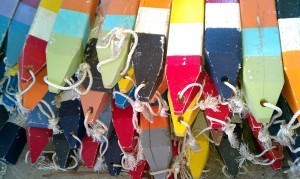 –here are a few things you might see.
–here are a few things you might see.
A revival taking place in a field set among pine barrens, cars and pickups parked on both sides of the road, a single strip mowed out of tall grass and a tall purple cross tilting over the bowed heads of those who came to be saved.
A spotted dog lying on top of a rusty pickup as it lazily makes its way around the dirt roads of a campground by Howard Creek.
 Roadside shacks selling boiled peanuts and beer.
Roadside shacks selling boiled peanuts and beer.
Oystermen raking the oyster beds of the estuarial waters of the bay, with giant rakes that look like tongs, from oyster boats that look like wide rowboats.
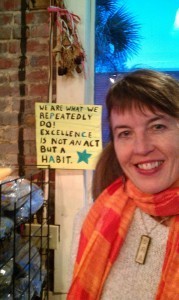 A sign at the Honey Hole Liquor Store that finally, after years of admiring it, you capture on camera.
A sign at the Honey Hole Liquor Store that finally, after years of admiring it, you capture on camera.
A peacock silhouetted against the night sky, wings tucked under himself and head drooping, asleep in the branches of a tall pine.
Baby alligators draped on half-submerged logs in the Apalachicola River, sunning themselves.
Shuckers standing behind the bar –any bar, any restaurant– heads down, plucking up oysters from a trough filled with ice and, with a single deft twist of an oyster knife, severing the muscle that holds the shell clenched shut. 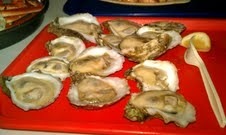
Red or brown plastic trays at a restaurant –any restaurant– piled with a dozen, a dozen meaning fourteen or so, oysters and slid unceremoniously onto a table. No bed of shaved ice. No formal presentation. Just a plastic tray of oysters, a plastic tub of horseradish, a roll of paper towels, a plastic squeeze bottle of cocktail sauce and an array of deep south hot sauce.
Mailboxes in the shape of giant open-mouth fish, one after another, mounted on wooden posts along a sandy byway.
 Houseboats, schoolbuses-turned-into-houses, trailers-with-additions-built-onto-both-sides, campers mounted on cement blocks, and sheds that function as houses, up and down the sides of the chocolate-milk water of the Apalachicola and all its tributaries.
Houseboats, schoolbuses-turned-into-houses, trailers-with-additions-built-onto-both-sides, campers mounted on cement blocks, and sheds that function as houses, up and down the sides of the chocolate-milk water of the Apalachicola and all its tributaries.
Hushpuppies, deep fried pickles and gumbo on most every menu, along with iced tea that must be specifed as Sweet or Unsweet.
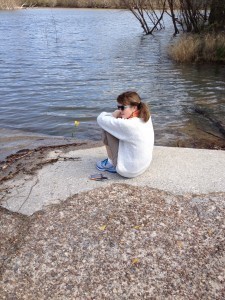 A yellow flower rooted in the mud of the river, somehow grown up out of it, blooming.
A yellow flower rooted in the mud of the river, somehow grown up out of it, blooming.
The night sky by a sea so free of artificial light that you can lean back and stare up at stars massed and glimmering overhead, threaded through the visible Milky Way.
A shooting star that falls so slowly you witness it break into trails of light as it flickers out and fades to nothing.
February 11, 2013
“Give freely of what you find”
 It was the end of a long day. You and your friend Absalom had spent it exploring the byways, talking and laughing and getting out of the car wherever the spirit moved you, taking in the sights and sounds and smells of the river and the tall pines and the pushing and pulling tides of this forgotten coast.
It was the end of a long day. You and your friend Absalom had spent it exploring the byways, talking and laughing and getting out of the car wherever the spirit moved you, taking in the sights and sounds and smells of the river and the tall pines and the pushing and pulling tides of this forgotten coast.
Now it was dusk. You parked, and the two of you walked into the little building next to the church. Fluorescent lighting buzzed overhead, and several long folding tables were set up in a square. There were four men there, plus you and Absalom.
This was the first time you had ever been to a meeting like this, and you were unsure of yourself. You felt like an outsider. Absalom had invited you and assured you that you would be welcome as a friend, that it was an “open” meeting.
Still, though. You aren’t an alcoholic and you had never struggled to defeat that demon of a disease the way these men had. It seemed intrusive to be there.
“You’re sure it’s okay?”
You had asked this of Absalom several times, and each time he had told you that yes, it was okay. That in fact you might find it to be a profound experience. So in you went, and shook hands with each of the men, and sat down at the plain table in the plain building attached to the little church, down here in the southern wild where you escape every February.
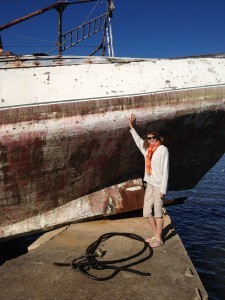 Absalom sat at the end of one table and you sat kitty-corner next to him. You watched as he rolled a little rubber ball around the table and tossed it from hand to hand. He has been going to these meetings for 17 years now, at least one a week.
Absalom sat at the end of one table and you sat kitty-corner next to him. You watched as he rolled a little rubber ball around the table and tossed it from hand to hand. He has been going to these meetings for 17 years now, at least one a week.
The leader of the meeting handed you a blue xeroxed piece of paper listing all the nearby meetings. You scanned them: Monday, Tuesday, Wednesday, Thursday, Friday, Saturday, Sunday, sometimes twice a day, in the tiny towns of this remote part of the panhandle.
The leaders talked for a while, then the men told their stories, one after another, in quiet voices. Each man was older than you and Absalom by probably 20 years, and each had come to this meeting way of life late. You were tired, and the overhead fluorescence hurt your eyes, and you worried that you were intruding. But you sat still and listened carefully.
One of the men talked about many years ago, when he and his wife were out for the evening and witnessed a young woman being thrown out of a bar, drunk and screaming and kicking.
The man had laughed. “My wife had a different perspective, though. She said, ‘look at that poor woman, she must be in so much pain.’ And I thought about that, and it changed something in me.”
You thought about it too, sitting there on the hard folding chair, and suddenly you were on the verge of tears. You thought about someone you love very much and the sort of pain that they too must be in, the kind of pain that drunken screaming laughter can’t really cover up.
The leader asked Absalom, as a new visitor, to tell his story and he did. You watched the little rubber ball bounce from hand to hand as he talked, revealing a whole part of his life that you knew little about.
You and Absalom have been buddies since the first week of college, when you were both 18 year old kids. 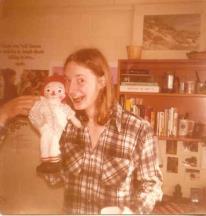 He lived one floor below you in a freshman dorm. He usually wore an old Army jacket and he smoked a lot of unfiltered Camel cigarettes.
He lived one floor below you in a freshman dorm. He usually wore an old Army jacket and he smoked a lot of unfiltered Camel cigarettes.
He had a big laugh, so big that he often ended up coughing and laughing at the same time. (This is something that still happens to him, now that you think of it.) You credit him with introducing you to John Prine, to whom he had set up a small shrine in the corner of his room.
Sometimes you would come home late at night from the library and walk into your room to see your rag doll or your stuffed dog silhouetted against the moonlit window, hanging by the neck from a noose that Absalom and his friend had hitched to the window frame. A horrifying and hilarious sight. Sometimes he and other friends would bang on your door and haul you downtown to one of the tiny town’s three bars, to drink and laugh.
You remained steadfast buddies throughout college, graduated, went your separate ways. Both of you got married and had children, built your working lives. You lost track of each other. Many years later the miraculous curse of Facebook brought you back together and the friendship sprang up anew.
Now here you were, at a meeting in a scraping-by town in the southern wild. You listened to him talk and you thought how little we know of the stories behind the people we pass on the street. How little we know, too often, about the people we most love.
You thought about the pain that Absalom was in, for so many years, and how he hid it from everyone. You thought about things that you yourself have hidden, or used to hide, and how hard you work now, not to hide.
Why is it so hard, this not-hiding?
What would it be like, to look at everyone, the known and the unknown, carefully, and listen with your whole heart, to what they are telling you?
There in that plain room with the buzzing overhead fluorescence, a group of people had gathered together with the sole purpose of not hiding. Of telling their stories. Of listening. Of saying Thank you.
At the end of the meeting, the leader asked you to read something and pushed a creased piece of paper over to you, which you accepted.
“I’m Alison and I’m not an alcoholic,” you told them –Hi, Alison– “but I too have been in the grip of something I felt helpless to get out of, in the past, and your stories feel familiar to me. Thank you for letting me listen to them.”
Then you read the words on the piece of paper. Some of them –Clear away the wreckage of your past. Give freely of what you find and join us. We shall be with you in the fellowship of the spirit– again brought you to the verge of tears.
You and Absalom walked out of the little building into a dark night lit by stars, massed overhead and threaded through the Milky Way. Before you spread the Gulf, its pushing and pulling waters quiet tonight.
“I wish everyone had meetings like that to go to,” you told him.
“I know,” he said.
As you drove through the dark you thought of the men’s faces there, in the room. Ordinary-looking men, not trying to impress anyone. There only to tell their stories and be reminded that they were not in this alone, this being the endless trying and the endless gratitude for what they had come to see was a life that was theirs, held tight in their own hands and then given over to something bigger than themselves.
February 9, 2013
Poem of the Week, by Virginia R. Terris
The Uninvited
- Virginia R. Terris
As the heads of state feast with one another, the tables in the
gilded hall loaded with caviar, venison, exotic fruits and veg-
etables and gallons of champagne, there’s a tapping on the
windows. A child’s face, then another, presses against the
panes, the eyes in them black as the night the children stand
in, their mouths open as if they were howling with the wind.
“Who are they?” ask the guests uneasily. “Where did they
come from?”
“Keep them out!” yells the host. “Get Security! Where’s
Security?”
But the children are so thin, they slip under the doors,
around the edges of the windows. Noiselessly. In great
numbers. They move forward to the tables. Their fingers
grip the edges of the tables. Their eyes gaze upwards into the
enormous openings and closings of official mouths.
For more information on Virginia R. Terris (who died last year), please click here: http://www.virginiarterris.zoomshare.com/0.html
–
Facebook: http://www.facebook.com/home.php?#!/pages/Alison-McGhee/119862491361265?ref=ts
February 2, 2013
Poem of the Week, by Wendell Berry
There is No Going Back
- Wendell Berry
No, no, there is no going back.
Less and less you are
that possibility you were.
More and more you have become
those lives and deaths
that have belonged to you.
You have become a sort of grave
containing much that was
and is no more in time, beloved
then, now, and always.
And so you have become a sort of tree
standing over a grave.
Now more than ever you can be
generous toward each day
that comes, young, to disappear
forever, and yet remain
unaging in the mind.
Every day you have less reason
not to give yourself away.
For more information on Wendell Berry, please click here: http://www.wendellberrybooks.com/
Facebook: http://www.facebook.com/home.php?#!/pages/Alison-McGhee/119862491361265?ref=ts
January 28, 2013
There is a sparkling choir
 Snow fell yesterday in the city in which you live, and like all new snow after weeks of no-snow, it transformed the ugly into the beautiful. Goodbye, brownish clots of street-worn slush. Hello, soft white velvet.
Snow fell yesterday in the city in which you live, and like all new snow after weeks of no-snow, it transformed the ugly into the beautiful. Goodbye, brownish clots of street-worn slush. Hello, soft white velvet.
At night, when the snow that has fallen all day ceases to fall and the streetlights come on and the moon rises, the snow sparkles. The dark air sparkles, too.
There were endless warnings last night about bad driving conditions, freezing rain and sleet earlier in the day now overlaid with a deceptive four inches of new snow, and you would have stayed home except that you had to teach an evening workshop just outside the city borders.
So out you went in your giant men’s boots and the mittens your mother gave you for Christmas last year, the ones that everyone covets because they’re fleece-lined wool and so pretty and so warm. You checked the trunk to make sure that the miniature shovel and jumper cables and extra blanket were in there, because
even though there was no chance you would possibly get stuck anywhere you couldn’t walk a few yards and be at someone’s warm house, you like to pretend you’re a pioneer.
You got to the house where the workshop was being held, but you were early, so you kept driving. Around and around unfamiliar streets you drove, slowly, so that you could take it all in.
The lamplit windows and the snow-laden pines in front of them.
The dark cat trotting through the snow at the side of the road.
The streetlights that gave off that yellowish glow that they always do at night in fresh snow.
The unplowed side streets with the single set of tire ruts that every car, no matter what direction it was going, followed.
The couple holding h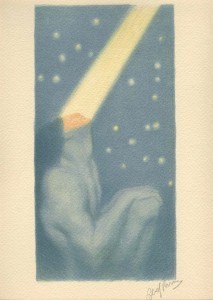 ands and laughing as they broke a path through a small field.
ands and laughing as they broke a path through a small field.
Dog Forest, where you sometimes take your dog so he can run up and down hills and you can tromp through the woods and where neither of you has to pause at the end of blocks to watch for cars.
You taught the workshop and then walked outside into the sparkling air. This was the first time you had worn your giant men’s snowboots since you broke your leg a couple of months ago. They felt great. Your leg felt great too. Almost great, anyway. Good. Pretty good. Good enough to shovel, anyway, which you were secretly longing to do.
You got in the car and meandered quietly back home, hoping that your youthful companion had stayed put while you were teaching and had decided against hauling herself out, shovel in hand. You hoped that when you got home you would find her where you’d left her, sitting on the couch and catching up on one of the several shows she’s addicted to, every episode of which features a gruesome murder and the quirky-but-dedicated team of investigators who solves it.
Sure enough, nothing had changed about either the snow or the youthful companion. This made you so happy. For the first time since the broken leg, you could go out and shovel.
Everyone has a method for shoveling snow. You like to begin with the front steps and sidewalk. If the snow’s not too deep you push the shovel –a bright yellow spring steel snow shovel, thanks– straight ahead of you down the middle of the walkway and sidewalk. Then, from the cleared middle, you shovel short perpendicular sweeps all the way to either side.
You get into a rhythm and don’t break it except to lean on the shovel every once in a while and look up at the dark sparkling night. You love the ache in your back and the ache in your legs and the way your heart beats hard when you shovel.
There’s an etiquette to city shoveling.
You need to clear every bit of your own property, but it’s good form to shovel beyond that into your neighbors’ territory, too. Not too far. Maybe a few feet. Enough so that they know you’re not being selfish and trying to get away with as little shoveling as possible.
With neighbors much older than you, though, neighbors like your 90-year-old neighbor, it’s a little more complicated. Good manners demand that you shovel a few feet beyond your own border, but should you continue on and shovel her entire sidewalk? Her steps?
This is a tricky question. At first it seems obvious: of course you should shovel your neighbor’s entire sidewalk. She’s 90 years old, for God’s sake! But your neighbor is deeply independent and likes to take care of her own house and yard. You’ve often seen her out shoveling her driveway and weeding her lawn.
And there was that one day last summer when you went bursting out your back door to investigate the intensely annoying thock, thock, thock sound you kept hearing, only to find her, at 90, hatcheting down some of the buckthorn on her side of the fence because it was starting to intrude on your side of the fence and she “didn’t want to annoy you.”
Back to the snow. You can tell that the hired shoveling crew who clears her sidewalks has already been by, so you settle for the token-good-manners additional three feet.
A tall man turns the corner at the end of the block and comes walking toward you. You’re shoveling your steps now. Damn, it feels good to be out shoveling. To be doing physical work, the kind of work you love, as opposed to the kind of work that exists all in your head and exhausts you from the inside out.
You give the tall man a big smile when he passes by and he gives you one back and says hello in what you decide is a Middle Eastern accent of some sort.
You’re both happy to be the only ones out, late at night, in the sparkling air of the sparkling snow.
Some days
the snow has taken me in
to know the time of snow, to live
inside a world so quiet
its music
is all a shimmering. Some evenings
when quite alone
I turn off every light
and watch the snow
enjoy the dark, moving lushly
through spiky air,
finding more time
in time
than when I stretch myself
and am
my father’s father. Oh yes,
there is
a sparkling choir, there surely is,
and dark ice air
through which we fall.
(Snow, by Kevin Hart)
January 26, 2013
Poem of the Week, by Moya Cannon
Viola D’Amore
- Moya Cannon
Sometimes, love does die,
but sometimes, a stream on porous rock,
it slips down into the inner dark of a hill,
joins with other hidden streams
to travel blind as the white fish that live in it.
It forsakes one underground streambed
for the cave that runs under it.
Unseen, it informs the hill
and, like the hidden streams of the viola d’amore,
makes the hill reverberate,
so that people who wander there
wonder why the hill sings,
wonder why they find wells.

–
For more information on Moya Cannon, please click here: http://www.californiapoetics.org/interviews/3818/an-interview-with-moya-cannon
–
Facebook: http://www.facebook.com/home.php?#!/pages/Alison-McGhee/119862491361265?ref=ts
January 19, 2013
Poem of the Week, by Dorianne Laux
Dark Charms
- Dorianne Laux
Eventually the future shows up everywhere:
those burly summers and unslept nights in deep
lines and dark splotches, thinning skin.
Here’s the corner store grown to a condo,
the bike reduced to one spinning wheel,
the ghost of a dog that used to be, her trail
no longer trodden, just a dip in the weeds.
The clear water we drank as thirsty children
still runs through our veins. Stars we saw then
we still see now, only fewer, dimmer, less often.
The old tunes play and continue to move us
in spite of our learning, the wraith of romance,
lost innocence, literature, the death of the poets.
We continue to speak, if only in whispers,
to something inside us that longs to be named.
We name it the past and drag it behind us,
bag like a lung filled with shadow and song,
dreams of running, the keys to lost names.
For more information on Dorianne Laux, please click here: http://doriannelaux.com/
Facebook: http://www.facebook.com/home.php?#!/pages/Alison-McGhee/119862491361265?ref=ts
January 12, 2013
Poem of the Week, by Maureen Micus Crisick
Suppose
- Maureen Micus Crisick
the ghetto stars pinned to cloth
could lift from history
like angels soaring to the sky.
The air which holds cinders
of Buddhist robes, burned hair
of ones who doused themselves, set fire,
suppose the plume of smoke
becomes clear and white.
What did I say?
I said: what if Sarajevo is not burning
and no city is burning
and in the market square
no human head is impaled on a stick
or mute limbs strewn on the streets,
and no fingers exist without hands.
Suppose grenades side with sunlight.
Bullets in boxes become
chocolate wrapped in gold foil,
and in Guatemala, the men come back
from their disappearance,
and in the morning, wake in their own beds
because love is the white moon
and light moves in us like blood.
Yes
there will be holes left in clothes
but not from ripped stars,
only from wear,
to let the darkness out.

–
I found Maureen Micus Crisick’s poem in this book: http://www.amazon.com/Poets-Companion-Pleasures-Writing-Poetry/dp/0393316548/ref=sr_1_1?s=books&ie=UTF8&qid=1358000383&sr=1-1&keywords=Maureen Micus Crisick
–
Facebook: http://www.facebook.com/home.php?#!/pages/Alison-McGhee/119862491361265?ref=ts
January 5, 2013
Poem of the Week, by Alden Nowlan
Great Things Have Happened
- Alden Nowlan
We were talking about the great things
that have happened in our lifetimes;
and I said, “Oh, I suppose the moon landing
was the greatest thing that has happened
in my time.” But, of course, we were all lying.
The truth is the moon landing didn’t mean
one-tenth as much to me as one night in 1963
when we lived in a three-room flat in what once had been
the mansion of some Victorian merchant prince
(our kitchen had been a clothes closet, I’m sure),
on a street where by now nobody lived
who could afford to live anywhere else.
That night, the three of us, Claudine, Johnnie and me,
woke up at half-past four in the morning
and ate cinnamon toast together.
“Is that all?” I hear somebody ask.
Oh, but we were silly with sleepiness
and, under our windows, the street-cleaners
were working their machines and conversing in Italian, and
everything was strange without being threatening,
even the tea-kettle whistled differently
than in the daytime: it was like the feeling
you get sometimes in a country you’ve never visited
before, when the bread doesn’t taste quite the same,
the butter is a small adventure, and they put
paprika on the table instead of pepper,
except that there was nobody in this country
except the three of us, half-tipsy with the wonder
of being alive, and wholly enveloped in love.

–
For more information on Alden Nowlan, please click here: http://www.poemhunter.com/alden-nowlan/biography/
–
Facebook: http://www.facebook.com/home.php?#!/pages/Alison-McGhee/119862491361265?ref=ts
January 3, 2013
Two one-day workshops, March 23 and April 20
Greetings, writers!
Are you looking to kickstart a particular writing project, rejuvenate your writing, or simply experience a one-afternoon writing adventure?
I’m teaching two one-day workshops, “The Order in Which It’s Told” and “Tense and Point of View,” at the fabulous Loft in the fabulous Open Book building, March 23 and April 20.
These are brief-but-intense four-hour workshops, I love teaching them, and I’d love to see you there. Click for info.




